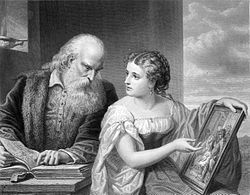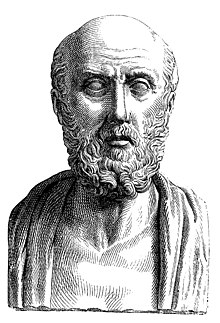Portal:History of science
The History of Science Portal
The history of science covers the development of science from ancient times to the present. It encompasses all three major branches of science: natural, social, and formal. Protoscience, early sciences, and natural philosophies such as alchemy and astrology during the Bronze Age, Iron Age, classical antiquity, and the Middle Ages declined during the early modern period after the establishment of formal disciplines of science in the Age of Enlightenment.
Science's earliest roots can be traced to Ancient Egypt and Mesopotamia around 3000 to 1200 BCE. These civilizations' contributions to mathematics, astronomy, and medicine influenced later Greek natural philosophy of classical antiquity, wherein formal attempts were made to provide explanations of events in the physical world based on natural causes. After the fall of the Western Roman Empire, knowledge of Greek conceptions of the world deteriorated in Latin-speaking Western Europe during the early centuries (400 to 1000 CE) of the Middle Ages, but continued to thrive in the Greek-speaking Byzantine Empire. Aided by translations of Greek texts, the Hellenistic worldview was preserved and absorbed into the Arabic-speaking Muslim world during the Islamic Golden Age. The recovery and assimilation of Greek works and Islamic inquiries into Western Europe from the 10th to 13th century revived the learning of natural philosophy in the West. Traditions of early science were also developed in ancient India and separately in ancient China, the Chinese model having influenced Vietnam, Korea and Japan before Western exploration. Among the Pre-Columbian peoples of Mesoamerica, the Zapotec civilization established their first known traditions of astronomy and mathematics for producing calendars, followed by other civilizations such as the Maya.
Natural philosophy was transformed during the Scientific Revolution in 16th- to 17th-century Europe, as new ideas and discoveries departed from previous Greek conceptions and traditions. The New Science that emerged was more mechanistic in its worldview, more integrated with mathematics, and more reliable and open as its knowledge was based on a newly defined scientific method. More "revolutions" in subsequent centuries soon followed. The chemical revolution of the 18th century, for instance, introduced new quantitative methods and measurements for chemistry. In the 19th century, new perspectives regarding the conservation of energy, age of Earth, and evolution came into focus. And in the 20th century, new discoveries in genetics and physics laid the foundations for new sub disciplines such as molecular biology and particle physics. Moreover, industrial and military concerns as well as the increasing complexity of new research endeavors ushered in the era of "big science," particularly after World War II. (Full article...)
Selected article -

In chemistry, the history of molecular theory traces the origins of the concept or idea of the existence of strong chemical bonds between two or more atoms.
A modern conceptualization of molecules began to develop in the 19th century along with experimental evidence for pure chemical elements and how individual atoms of different chemical elements such as hydrogen and oxygen can combine to form chemically stable molecules such as water molecules. (Full article...)Selected image

The late 19th century was a period of increased tension and conflict between science and religion; the relationship is dramatized in this engraving by W. Ridgway (published in 1878) after Daniel Huntington's 1868 painting Philosophy and Christian Art. An attractive young woman attempts to persuade a wizened natural philosopher of the virtue of Christian art (in the form of an adoration scene), while he resolutely points to his book, the pages of which read "SCIENTIA" and "MECHANICA", in answer. In addition to youth and beauty, the young woman has nature itself, seen through the window, on her side. (In the original painting, the landscape is a somewhat wilder Romantic scene, meant to emphasize the power of nature.)
Did you know
...that the history of biochemistry spans approximately 400 years, but the word "biochemistry" in the modern sense was first proposed only in 1903, by German chemist Carl Neuberg?
...that the Great Comet of 1577 was viewed by people all over Europe, including famous Danish astronomer Tycho Brahe and the six year old Johannes Kepler?
...that the Society for Social Studies of Science (often abbreviated as 4S) is, as its website claims, "the oldest and largest scholarly association devoted to understanding science and technology"?
Selected Biography -
Hippocrates of Kos (/hɪˈpɒkrətiːz/, Greek: Ἱπποκράτης ὁ Κῷος, translit. Hippokrátēs ho Kôios; c. 460 – c. 370 BC), also known as Hippocrates II, was a Greek physician and philosopher of the classical period who is considered one of the most outstanding figures in the history of medicine. He is traditionally referred to as the "Father of Medicine" in recognition of his lasting contributions to the field, such as the use of prognosis and clinical observation, the systematic categorization of diseases, and the (however misguided) formulation of humoral theory. The Hippocratic school of medicine revolutionized ancient Greek medicine, establishing it as a discipline distinct from other fields with which it had traditionally been associated (theurgy and philosophy), thus establishing medicine as a profession.
However, the achievements of the writers of the Hippocratic Corpus, the practitioners of Hippocratic medicine, and the actions of Hippocrates himself were often conflated; thus very little is known about what Hippocrates actually thought, wrote, and did. Hippocrates is commonly portrayed as the paragon of the ancient physician and credited with coining the Hippocratic Oath, which is still relevant and in use today. He is also credited with greatly advancing the systematic study of clinical medicine, summing up the medical knowledge of previous schools, and prescribing practices for physicians through the Hippocratic Corpus and other works. (Full article...)Selected anniversaries
- 1751 - Death of Christopher Polhem, Swedish scientist and inventor (b. 1661)
- 1852 - Birth of Jacobus Henricus van 't Hoff, Dutch physical and organic chemist Nobel Prize laureate (d. 1911)
- 1856 - Birth of Carle David Tolmé Runge, German physicist (d. 1927)
- 1871 - Birth of Ernest Rutherford, New Zealand-born Nobel Prize in Chemistry laureate (d. 1937)
- 1884 - Birth of Theodor Svedberg, Swedish chemist Nobel Prize laureate (d. 1971)
- 1912 - Birth of Edward Mills Purcell, American physicist Nobel Prize laureate (d. 1997)
- 1928 - Death of Wilhelm Wien, German physicist, Nobel Prize laureate (b. 1864)
- 1940 - Death of J.J. Thomson, English physicist, Nobel Prize laureate (b. 1856)
- 1941 - Death of Peder Oluf Pedersen, Danish engineer and physicist (b. 1874)
Related portals
Topics
General images
Subcategories
Things you can do
Help out by participating in the History of Science Wikiproject (which also coordinates the histories of medicine, technology and philosophy of science) or join the discussion.
Associated Wikimedia
The following Wikimedia Foundation sister projects provide more on this subject:
-
Commons
Free media repository -
Wikibooks
Free textbooks and manuals -
Wikidata
Free knowledge base -
Wikinews
Free-content news -
Wikiquote
Collection of quotations -
Wikisource
Free-content library -
Wikiversity
Free learning tools -
Wiktionary
Dictionary and thesaurus









































































